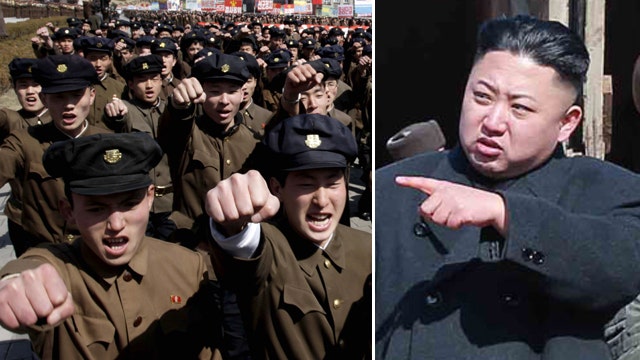North Korea threatens to 'settle accounts with the US'
Regime ramps up rhetoric after B-2 bombers participate in South Korea training exercise
North Korean dictator Kim Jong Un's latest threat to "settle accounts with the U.S." -- while displaying a "strike plan" that shows missiles tracking toward American cities -- was widely seen as another example of the young leader's erratic bluster.
The threat to lob long-range nuclear-tipped missiles at central U.S. cities is, in the opinion of most expert observers, overblown. But while making progress on its missile capability, the regime has other ways to wreak havoc, and this is what has officials and analysts increasingly worried.
"You only need to be wrong once," Defense Secretary Chuck Hagel said, in discussing assessments of North Korea. "I don't know what president or what chairman or what secretary of Defense wants to be wrong once when it comes to nuclear threats."
Officials are concerned that with the rising threats, Kim is backing his regime into a corner where it may be compelled to act in order to save face. And in the near-term, the regime has plenty of ways to do that.
It can continue to proliferate dangerous weapons to places like Iran and Syria. And, as it has repeatedly demonstrated, the regime can attack and provoke South Korea -- the scenario many are worried about.
"We're one dead fisherman away from something that could escalate quite quickly," said Jim Walsh, an international security expert and research associate at MIT. "That's the one I worry about."
Walsh said despite the rhetoric, the "war fundamentals" have not changed. North Korea would be obliterated by South Korea in the event of a war, with or without U.S. military support -- and the North Koreans know that.
But he said the "accidental war" -- the provocation that goes too far and spirals into all-out conflict -- is the real worry.
"The whole system is set up like a deck of cards right now," Walsh said.
North Korea is infamous for testing and prodding South Korea. In 2010, under the current leader's late father Kim Jong Il, North Korea was blamed for sinking a South Korean ship and killing 46 sailors, though North Korea denied it. That time, there were no serious repercussions for the North.
Michael O'Hanlon, a senior fellow at the Brookings Institution, suggested South Korea's new president, Park Geun-hye, would not let such an attack slide.
"If that were to happen again or something like it, I believe it could lead to war," O'Hanlon said.
Walsh said that while North Korea would fall, in the best-case scenario "you still get ... 1,000 artillery shells landing on Seoul."
O'Hanlon described a scenario where South Korea retaliates and North Korea escalates -- and eventually the U.S. would be faced with the question of how to get involved militarily.
Hagel said Thursday that the U.S. "will unequivocally defend and we are unequivocally committed to that alliance with South Korea."
Back in 1984, the U.S. prepared a campaign plan that would have made possible the destruction of the entire North Korean air force in 100 hours. Retired U.S. Air Force generals say the military could do it even faster today.
The Pentagon made clear this week that it is taking the threat seriously. It flew B-2 bombers 13,000 miles to a South Korean island where they dropped inert bombs. It is the first time the U.S. has ever sent B-2 bombers to the Korean Peninsula. A tweet from the U.S. embassy in Seoul said the bombers were "demonstrating the US's ability to conduct precision strikes at will."
Christian Whiton, a former State Department official now with the D.C. International Advisory, told Fox News that the major threat from North Korea is that "it's proliferated virtually every weapon system it's ever produced."
"There's a real threat that North Korea will continue to do what it does best, which is to profit off of proliferating the world's most dangerous weapons to some of the world's most odious people," he said.
Despite repeated nuclear and missile tests, it is believed North Korea is still years away from being able hit the U.S. with a nuclear-tipped missile.
The Council on Foreign Relations projects that only North Korea's Taepodong-2 missile could reach America. But that missile could only go as far as Alaska and has not yet been successfully tested. Its other rockets have a considerably shorter range.
While having made progress in their ballistic missile program, the North Koreans still have not mastered the technology of delivering a nuclear device by a long-range missile.
"If they ever do it, it's going to be a while," Walsh said of any effort to develop a missile capable of hitting the continental U.S.
Walsh also said it's unlikely North Korea would ever send out a suicide bomber -- equipped with a radioactive "dirty bomb" or some similar device -- describing the move as too risky without much payoff for Pyongyang.
FoxNews.com's Judson Berger and Fox News' Jennifer Griffin contributed to this report.





